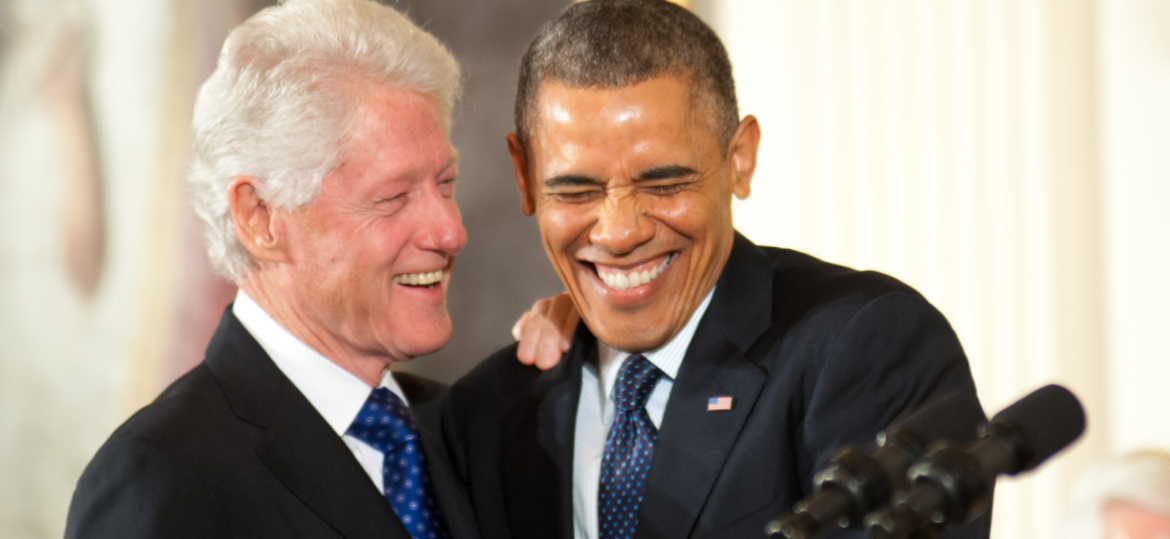
Among liberals, it’s almost universally assumed that of the two major parties, it’s the Republicans who have become more extreme over the years. That’s a self-flattering but false narrative.
This is not to say the Republican Party hasn’t become a more conservative party. It has. But in the last two decades the Democratic Party has moved substantially further to the left than the Republican Party has shifted to the right. On most major issues the Republican Party hasn’t moved very much from where it was during the Gingrich era in the mid-1990s.
To see just how far the Democratic Party has moved to the left, compare Barack Obama with Bill Clinton. In 1992, Mr. Clinton ran as a centrist New Democrat. In several respects he governed as one as well. He endorsed a sentencing policy of “three strikes and you’re out,” and he proposed adding 100,000 police officers to the streets.
In contrast, President Obama’s former attorney general, Eric H. Holder Jr., criticized what he called “widespread incarceration” and championed the first decrease in the federal prison population in more than three decades. Mr. Obama, meanwhile, has chosen to focus on police abuses.
One of the crowning legislative achievements under Mr. Clinton was welfare reform. Mr. Obama, on the other hand, loosened welfare-to-work requirements. Mr. Obama is more liberal than Mr. Clinton was on gay rights, religious liberties, abortion rights, drug legalization and climate change. He has focused far more attention on income inequality than did Mr. Clinton, who stressed opportunity and mobility. While Mr. Clinton ended one entitlement program (Aid to Families With Dependent Children), Mr. Obama is responsible for creating the Affordable Care Act, the largest new entitlement since the Great Society. He is the first president to essentially nationalize health care.
Mr. Clinton lowered the capital-gains tax rate; Mr. Obama has proposed raising it. Mr. Clinton cut spending and produced a surplus. Under Mr. Obama, spending and the deficit reached record levels. In foreign policy, Mr. Obama has shown himself to be far more critical of traditional allies and more supine toward our adversaries than Mr. Clinton was. Mr. Obama has often acted as if American strength is a problem to which the solution is retrenchment, or even retreat.
Another bellwether: Hillary Rodham Clinton, in positioning herself for the 2016 election, is decidedly more liberal than she and her husband once were on illegal immigration, gay marriage and incarceration. She has called to “end the era of mass incarceration” and spoken about the importance of “toppling” the wealthiest 1 percent. She has remained noncommittal on the Trans-Pacific Partnership, the free-trade agreement that has drawn ire from the left.
The Democratic Party, then, has moved steadily to the left since the Clinton presidency. In fact, since his re-election, Mr. Obama’s inner progressive has been liberated. (An exception is the administration’s conditional approval of oil drilling off the Alaskan coast, starting this summer.) Other examples are his executive action granting temporary legal status to millions of illegal immigrants, his claim that gay marriage is a constitutional right, and his veto of legislation authorizing construction of the Keystone XL pipeline.
The Democratic Party is now a pre-Bill Clinton party, the result of Mr. Obama’s own ideological predilections and the coalition he has built. Liberals will argue that the Democratic Party has benefited from this movement to the left and cite the election victories of Mr. Obama as evidence of it. The nation has become more liberal, they say, and the Democratic Party has wisely moved with it.
In some respects, like gay rights, the nation is more liberal than it was two decades ago. On the other hand, it is more conservative today than it was in the mid-1990s. A recent Pew Research Center poll found that Republicans have opened substantial leads over Democrats on dealing with terrorism, foreign policy and taxes. They’re competitive on the economy, and a good deal more competitive than in the past on traditional liberal issues like immigration and health care. Self-identified conservatives significantly outnumber self-identified liberals.
One can also plausibly argue that the Republican Party is the governing party in America. After two enormous losses by Democrats in the 2010 and 2014 midterm elections, Republicans control the Senate and the House of Representatives. There are currently 31 Republican governors compared with 18 for Democrats. Republicans control 68 of 98 state legislative chambers and the most state legislative seats since the 1920s. Nearly half of Americans now live in states under total Republican control. The Obama years have been politically good for Mr. Obama; they have been disastrous for his party. That is a problematic legacy for a man who envisioned himself as a Franklin Delano Roosevelt-like transformational political figure.
Those who insist that the Democratic Party’s march to the left carries no political risks might consider the fate of the British Labour Party earlier this month. Ed Miliband, its leader, ran hard to the left. The result? The Conservative Party under David Cameron won its first outright majority in Parliament since 1992. Before the election, the former Labour prime minister Tony Blair warned his party against letting the election become one in which “a traditional left-wing party competes with a traditional right-wing party, with the traditional result.”
Mr. Clinton acted on a lesson Democrats learned the hard way, and moved his party more to the center on fiscal policy, welfare, crime, the culture and foreign policy. Progressive figures like Senator Elizabeth Warren and Mayor Bill de Blasio are the politicians who electrify the Democratic base.
For demographic reasons, many Democrats believe that they are riding a tide of presidential inevitability. They may want to rethink that. They are placing a very risky bet that there are virtually no limits to how far left they can go.
Peter Wehner, a senior fellow at the Ethics and Public Policy Center, served in the last three Republican administrations and is a contributing opinion writer.

